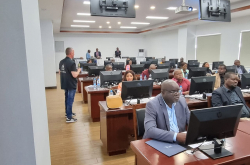For law enforcement engaged in counter-terrorism, apprehending a terrorist is sometimes only where the longer-term challenges begin.
As countries around the world have painstakingly realized, prisons can be a prime location for terrorists to proselytize their ideologies and recruit fellow inmates. The ‘revolving door’ nature of prison offers terrorists a continuous supply of potential new recruits to radicalize.
Regrettably, this challenge is only likely to grow as countries seek to detect, prosecute and detain thousands of foreign terrorist fighters (FTFs) from Iraq, Syria and other conflict zones.
The threat of radicalized prisoners
Prison radicalization means that many individuals with terrorist ideologies continue to pose a serious threat to public safety upon their release. This threat grows all the more poignant when we consider that a growing number of individuals convicted for terrorism are being released from prison.
While some may assume that convicted terrorists always serve long stretches in prison, the average length of a sentence for terrorist offenses is less than 10 years. And many terrorists arrested are relatively young, with the average released terrorist offender being in their early 30s.
Without denying the right of individuals who have served their sentence to freely resume their lives in communities, terrorist attacks in recent years by individuals released from prison have demonstrated the ongoing need for law enforcement to manage this legacy risk.
Moreover, the high percentage of FTFs imprisoned and the importance of international travel to carry out terrorist activity means that any counter-terrorism effort must be international in scope and capitalize on INTERPOL’s global policing capabilities.
Blue and Green Notices
In this heightened global context, law enforcement officials from 12 countries spanning counter-terrorism, intelligence and prison services participated in a working group meeting last month on prison radicalization hosted by INTERPOL.
At the meeting, officials from countries such as Austria, Spain and the United States presented case studies and best practices and all participants were able to discuss strategies to better detect and strengthen information sharing on radicalized prisoners to prevent future attacks.
As one key recommendation for the future, officials were encouraged to leverage INTERPOL Blue and Green Notices in cases of where inmates were considered to pose a threat when released.
INTERPOL National Central Bureaus (NCBs) can request a Blue Notice to obtain information, locate, or identify a person of interest. A Green Notice can be requested to provide a warning about a person’s criminal activities, where the person is considered a possible threat to public safety.
“Unlike most action films which end when the terrorist is caught, the threat posed by these individuals doesn’t disappear once they are placed behind bars,” said Greg Hinds, INTERPOL’s Counter-Terrorism Director.
“Prison radicalization is a global threat that requires an intense level of global police cooperation in order to thwart future attacks and keep the public safe,” Mr Hinds added.
Funded by the INTERPOL Foundation for a Safer World, the meeting was part of the INTERPOL Counter-Terrorism Global Initiative, which is focused on assisting member countries to prevent and disrupt transnational terrorist activities.
Related news

Border security threats focus of STOP operations in Africa
8 December 2023






